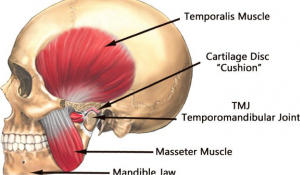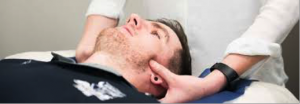
Do you suffer from:
These are all common symptoms of TMJ dysfunction.
The temporomandibular joint or TMJ is the joint where your jaw bone (mandible) connects to your skull bones (temporal bones). It is a complex joint with lots of small and importantly very strong muscles that attach around the jaw to control it’s movement. Your larger neck/shoulder muscles also have a role to play. It is a complex joint that enables us to eat, chew and speak. However, if the TMJ is not working well, you can experience a wide range of symptoms.

Image: Anatomy of the TMJ along with just a few of the many muscles that may contributing to your TMJ dysfunction. There is also a small fibrocartilaginous disc that assists (or hinders) movement of the TMJ.
TMJ pain is often a result of a combination of contributing causes. It can be hard to know exact what approach to take with treatment or WHO the best clinician is to see as there are a number of health professionals who are able to help with your TMJ pain/dysfunction. The most commonly seen professionals are:
Your dentist is often the first professional we think of seeing when out jaw hurts! They routinely will assist your condition by reviewing your bite, teeth alignment and may even prescribe a splint to assist with your TMJ movement – particularly closing. This type of treatment approach may be used temporarily for a period of weeks to months, or recommended as a more long term solution. Referral to an orthodontist may also happen to see if longer term teeth alignment solutions will assist with your jaw pain and dysfunction.
Some of our physio’s have undergone extra training to assist with TMJ pain and function. After a thorough assessment of your TMJ movement, neck and back postures/movement and discussion of your presenting symptoms, a range of physiotherapy techniques may be used including:

Physiotherapy treatment can be effective in the management of pain caused by TMJ dysfunction
If you have jaw pain or experience any of the symptoms above make an appointment to see our expert Physiotherapists who will assess and guide you in your recovery.